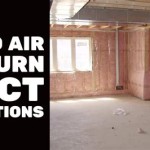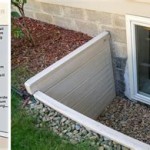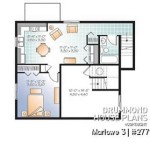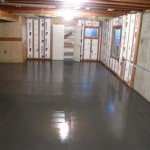```html
How Much Does It Cost Per Sq Ft To Finish a Basement?
Finishing a basement can significantly increase a home’s living space and overall value. However, a common question for homeowners considering this project is, "How much does it cost per square foot to finish a basement?" The answer isn't straightforward, as various factors influence the final price. This article aims to provide a detailed breakdown of these factors and offer a realistic range for the cost per square foot to finish a basement.
Generally, the cost to finish a basement can range from $30 to $100 or more per square foot. This wide range reflects the variability in project scope, material choices, and regional labor costs. A simple, functional finishing with basic materials will fall on the lower end of the spectrum, while a high-end renovation with custom features and premium materials will naturally command a higher price.
Key Point 1: Factors Influencing the Cost
Several key factors play a crucial role in determining the cost per square foot to finish a basement. Understanding these factors is essential for accurately estimating the overall project budget.
Square Footage: The most obvious factor is the size of the basement itself. Larger basements inherently require more materials and labor, translating to a higher total project cost. However, the cost per square foot may slightly decrease as the project size increases due to economies of scale in purchasing materials and optimizing labor.
Design Complexity: The complexity of the desired layout significantly impacts the cost. Open-concept designs are generally less expensive than those requiring numerous walls, doors, and custom features. Adding bathrooms, kitchens, or home theaters increases the complexity and cost due to the plumbing, electrical, and specialized installations involved.
Material Choices: The materials selected for flooring, walls, ceilings, and fixtures have a substantial impact on the final price. Budget-friendly options like basic carpeting and drywall will keep costs down, while premium materials like hardwood flooring, custom cabinets, and high-end appliances will significantly increase the cost per square foot. Consider the long-term value and durability of materials when making these decisions.
Labor Costs: Labor costs vary significantly depending on the region, the contractor's experience, and the complexity of the project. Areas with higher costs of living typically have higher labor rates. Obtaining multiple quotes from reputable contractors is essential to ensure a competitive price. Remember that the lowest bid isn't always the best choice; prioritize experience, qualifications, and positive reviews.
Permits and Inspections: Building permits are typically required for basement finishing projects to ensure compliance with local building codes and safety regulations. Permit fees vary by municipality and are an essential part of the overall project cost. Inspections are also required at various stages of the project to verify that the work meets code standards.
Existing Basement Conditions: The existing condition of the basement can significantly impact costs. If the basement has moisture issues, requires structural repairs, or has low ceilings, the project will require additional work and expenses. Addressing these issues is crucial before starting the finishing process to ensure a safe and stable living space. Mold remediation, waterproofing, and ceiling height adjustments can all add to the overall cost.
Plumbing and Electrical Work: Adding new bathrooms, kitchens, or wet bars requires plumbing and electrical work. This can be a significant expense, especially if the existing plumbing and electrical systems need upgrades. Hiring licensed plumbers and electricians is essential to ensure that the work is done safely and complies with code requirements.
HVAC System Modifications: Depending on the size and layout of the finished basement, modifications to the existing HVAC system may be necessary to ensure proper heating and cooling. This can involve extending ductwork, adding new vents, or installing a separate HVAC unit for the basement. Consulting with an HVAC professional is recommended to determine the best solution for the specific project.
Key Point 2: Breaking Down the Costs by Category
To better understand where the money goes when finishing a basement, it's helpful to break down the costs by category. This provides a clearer picture of the relative expense of each component of the project.
Framing and Drywall: Framing and drywall typically account for a significant portion of the overall cost. This includes building interior walls, framing around windows and doors, and installing drywall. Expect to spend around $4 to $8 per square foot for this part of the project, depending on the complexity of the layout and the type of drywall used.
Flooring: Flooring costs vary widely depending on the material chosen. Basic carpeting can cost as little as $2 to $5 per square foot, while luxury vinyl plank (LVP) can range from $4 to $8 per square foot. Hardwood flooring can cost $8 to $15 or more per square foot, depending on the species and grade of wood. Tile flooring can range from $5 to $15 per square foot, depending on the type of tile and the complexity of the installation.
Electrical: Electrical work typically costs between $3 to $6 per square foot, depending on the number of outlets, switches, and light fixtures installed. This includes wiring for lighting, outlets, and appliances, as well as installing a new circuit breaker panel if necessary.
Plumbing: Plumbing costs can range from $5 to $10 or more per square foot if adding a bathroom or kitchen. This includes running new water and drain lines, installing fixtures, and connecting to the existing plumbing system.
HVAC: HVAC modifications can cost between $2 to $5 per square foot, depending on the extent of the work required. This includes extending ductwork, adding new vents, and installing a separate HVAC unit if necessary.
Permits and Inspections: Permit fees typically range from $500 to $2,000, depending on the municipality and the scope of the project. Inspection fees are usually included in the permit fee.
Finishes and Fixtures: Finishes and fixtures include items like paint, trim, doors, windows, light fixtures, and bathroom/kitchen fixtures. The cost of these items varies widely depending on the quality and style chosen. Setting a budget for these items is crucial to avoid overspending.
Labor: Labor costs typically account for 30% to 50% of the total project cost. The exact percentage depends on the region, the contractor's experience, and the complexity of the project. Obtaining multiple quotes and comparing labor rates is essential to ensure a competitive price.
Key Point 3: Strategies for Managing Costs
Finishing a basement can be a significant investment, but there are several strategies homeowners can employ to manage costs and stay within budget.
Prioritize Needs vs. Wants: Carefully consider the intended use of the finished basement and prioritize needs over wants. Focus on essential elements such as framing, drywall, flooring, and electrical wiring before adding luxury features like a home theater or a custom bar. You can always add these features later as your budget allows.
Choose Cost-Effective Materials: Opt for budget-friendly materials like basic carpeting, vinyl flooring, and standard drywall. These materials can still provide a functional and aesthetically pleasing finish without breaking the bank. Consider laminate flooring as a durable and cost-effective alternative to hardwood.
DIY Where Possible: While it's crucial to hire licensed professionals for plumbing and electrical work, homeowners can save money by tackling some of the less technical tasks themselves. This might include painting, installing trim, or basic demolition work. However, be realistic about your skills and abilities and avoid taking on tasks that are beyond your expertise.
Obtain Multiple Quotes: Getting quotes from at least three reputable contractors is essential for ensuring a competitive price. Compare the quotes carefully, paying attention to the scope of work included, the materials specified, and the payment schedule. Don't automatically choose the lowest bid; prioritize experience, qualifications, and positive reviews.
Plan Ahead: Careful planning is crucial for managing costs and avoiding unexpected expenses. Work with a designer or architect to create a detailed plan that includes all aspects of the project, from the layout to the materials to the finishes. This will help you avoid costly changes during construction.
Consider Financing Options: If you don't have enough cash on hand to cover the cost of the project, consider financing options such as a home equity loan or a personal loan. Compare interest rates and terms carefully to find the best option for your financial situation.
Maintain Realistic Expectations: Basement finishing projects often encounter unexpected challenges, such as moisture issues or structural problems. Be prepared for potential cost overruns and budget accordingly. Having a contingency fund of 10% to 15% of the total project cost is a good idea to cover unforeseen expenses.
Ultimately, the cost per square foot to finish a basement is a highly individualized figure. By carefully considering the factors outlined above and implementing cost-saving strategies, homeowners can make informed decisions and create a finished basement that meets their needs and budget.
```
Cost To Finish A Basement In 2024 Forbes Home

How Much Does It Cost To Finish A Basement 2024 Data Bob Vila

The Cold Hard Numbers Cost To Finish Basement

How Much Does It Cost To Finish A Basement Csg Renovation

What S The Average Cost To Finish A Basement

Average Basement Finishing Remodeling Cost In Boston Ma Kaks

How Much Does It Cost To Finish A Basement 2024

How Much Does It Cost To Finish A Basement In 2024

Fixr Com Cost To Remodel A Basement Renovation

How Much Does It Cost To Finish A Basement In 2024
Related Posts







